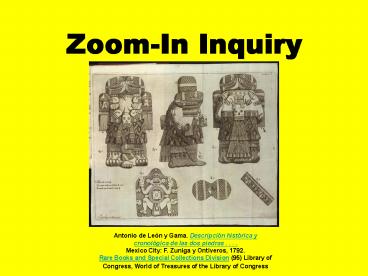ZoomIn Inquiry PowerPoint PPT Presentation
1 / 12
Title: ZoomIn Inquiry
1
Zoom-In Inquiry
Antonio de León y Gama. Descripción histórica y
cronológica de las dos piedras . . . .Mexico
City F. Zuniga y Ontiveros, 1792. Rare Books
and Special Collections Division (95) Library of
Congress, World of Treasures of the Library of
Congress
2
How might primary sources help us understand
mathematics? Examine primary sources.
Determine what you see and what questions you
might ask to get the big picture.
3
- What symbols do you see?
- What do you think you know about this primary
source?
4
- What additional symbols do you see?
- Describe any symbol you see. Classify the symbols
by categories.
5
- Do you see numbers?
- Do you see geometric shapes?
- Do you see letters?
6
- Explain what
- you think
- this is.
- How do you
- think people
- used this?
- Clothing
- An ornament
- A calendar
- A painting
- What clues support your ideas?
7
Eduardo Matos Moctezuma. La Piedra del Sol.
Calendario Azteca(Sunstone. The Aztec Calendar).
México 1992 General Collections (95.1) Library
of Congress, World Treasures of the Library of
Congress
8
- Why do you think the sculptor chose to use these
symbols in the design of the Aztec Calendar?
9
- How do these symbols relate to the purpose of
these calendars?
10
- Understanding the Big Picture
- How are patterns applied when designing calendars?
11
- Aztec Calendar Stone
- In 1790 workers repaving near the Cathedral in
Mexico City discovered a stone eleven and
one-half feet in diameter inscribed with the
Aztec calendar. The stone have had bright
polychrome colors and would have held sacrificed
human hearts that the Aztecas believed were
needed to feed the sun and keep civilization
alive. This first study of the stone explained
its 260-day divinatory cycle. The stones
colossal size, elaborate patterning, and symbolic
imagery have made it an unofficial emblem of
Mexico. - Source Eduardo Matos Moctezuma. La Piedra del
Sol. Calendario Azteca(Sunstone. The Aztec
Calendar). México 1992 General Collections
(95.1), Library of Congress, World Treasures of
the Library of Congress
12
Gen'y Yoshida. Hkan hikets shusei. Tokyo Sshid,
1882. Japanese Section, Asian Division (97),
Library of Congress, World Treasures of the
Library of Congress
Bahera Haszab, (Comptus). 1902. African and
Middle Eastern Division (99.1) Library of
Congress, World Treasures of the Library of
Congress
- Examine these primary sources to see how patterns
were applied in calendar design. - How do patterns help civilizations understand the
world?
Almanac for Hindu year 1871-1872. Rajastan,
India 1871. Fabric. Southern Asian Section,
Asian Division (92), Library of Congress, World
Treasures of the Library of Congress

